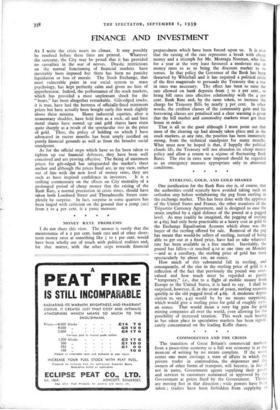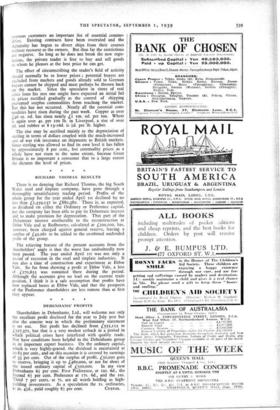* * * *
COMMODITIES AND THE CRISIS
The transition of Great Britain's commercial markets from a peace-time economy to a full war economy is at the moment of writing by no means complete. If the worst comes one must envisage a state of affairs in which the private trader in commodities, the shipowner and the owners of other forms of transport, will become, in fact if not in name, Government agents supplying their goods and services to customers nominated or approved by the Government at prices fixed by the Government. Things are moving fast in that direction ; wide powers have been taken ; traders have been forbidden from supplying to overseas customers an important list of essential commo- dities. Existing contracts have been overruled and the Admiralty has begun to divert ships from their courses without recourse to the owners. But thus far the restrictions are negative. So long as he does not break the new regu- lations, the private trader is free to buy and sell goods to whom he pleases at the best price he can get.
The effect of circumscribing the trader's field of activity should normally be to lower prices ; potential buyers are excluded from markets and goods already sold to German buyers cannot be shipped and must perhaps be thrown back on the market. Since the speculator in times of real crisis loses his zest one might have expected an initial fall in prices rectified gradually as the control of shipping prevented surplus commodities from reaching the market. But this has not occurred. Nearly all the essential com- modities have risen during the past week. Copper at over £46 os. od. has risen nearly £1 Los. od. per ton. Wheat is again over 4s. per too lb. in Liverpool, a rise of over 5d. and rubber at 8 13-16d. is lid. per lb. higher.
The rise may be ascribed mainly to the depreciation of sterling in terms of dollars coupled with the much-increased cost of war risk insurance on shipments to British markets. Since sterling was allowed to find its own level it has fallen by approximately 8 per cent., but commodity prices as a whole have not risen to the same extent, because Great Britain is so important a consumer that to a large extent she dictates the level of prices.



































 Previous page
Previous page